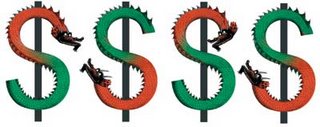
The restructuring of China from a State Captitalist economy to a mixed economy forces it to liberalize its labour laws. This does not yet mean that there will be independent worker controled unions, but it is a step forward.
And guess who opposes the idea of labour law liberalization and loves the old style Stalinist party controled apparatchik unions? Why American Capitalists!
What China needs, is a new workers movement and free unions not State unions.
China Drafts Law to Boost Unions and End Labor Abuse
China is planning to adopt a new law that seeks to crack down on sweatshops and protect workers’ rights by giving labor unions real power for the first time since it introduced market forces in the 1980’s.
The move, which underscores the government’s growing concern about the widening income gap and threats of social unrest, is setting off a battle with American and other foreign corporations that have lobbied against it by hinting that they may build fewer factories here.
The proposed rules are being considered after the Chinese Communist Party endorsed a new doctrine that will put greater emphasis on tackling the severe side effects of the country’s remarkable growth.
Whether the foreign corporations will follow through on their warnings is unclear because of the many advantages of being in China — even with restrictions and higher costs that may stem from the new law.Some of the world’s big companies have expressed concern that the new rules would revive some aspects of socialism and borrow too heavily from labor laws in union-friendly countries like France and Germany.
The Chinese government proposal, for example, would make it more difficult to lay off workers, a condition that some companies contend would be so onerous that they might slow their investments in China.
“This is really two steps backward after three steps forward,” said Kenneth Tung, Asia-Pacific director of legal affairs at the Goodyear Tire and Rubber Company in Hong Kong and a legal adviser to the American Chamber of Commerce here.
The proposed law is being debated after Wal-Mart Stores, the world’s biggest retailer, was forced to accept unions in its Chinese outlets.
State-controlled unions here have not wielded much power in the past, but after years of reports of worker abuse, the government seems determined to give its union new powers to negotiate worker contracts, safety protection and workplace ground rules.
Hoping to head off some of the rules, representatives of some American companies are waging an intense lobbying campaign to persuade the Chinese government to revise or abandon the proposed law.
The skirmish has pitted the American Chamber of Commerce — which represents corporations including Dell, Ford, General Electric, Microsoft and Nike — against labor activists and the All-China Federation of Trade Unions, the Communist Party’s official union organization.
The workers’ advocates say that the proposed labor rules — and more important, enforcement powers — are long overdue, and they accuse the American businesses of favoring a system that has led to widespread labor abuse.
On Friday, Global Labor Strategies, a group that supports labor rights policies, is expected to release a report in New York and Boston denouncing American corporations for opposing legislation that would give Chinese workers stronger rights.
“You have big corporations opposing basically modest reforms,” said Tim Costello, an official of the group and a longtime labor union advocate. “This flies in the face of the idea that globalization and corporations will raise standards around the world.”

See:
China
State Capitalism
Unions
Find blog posts, photos, events and more off-site about:
China, unions, labour, WalMart, Nike, corporations, labour-law, labor, labor=laws, unions, workers, worker-rights,
No comments:
Post a Comment